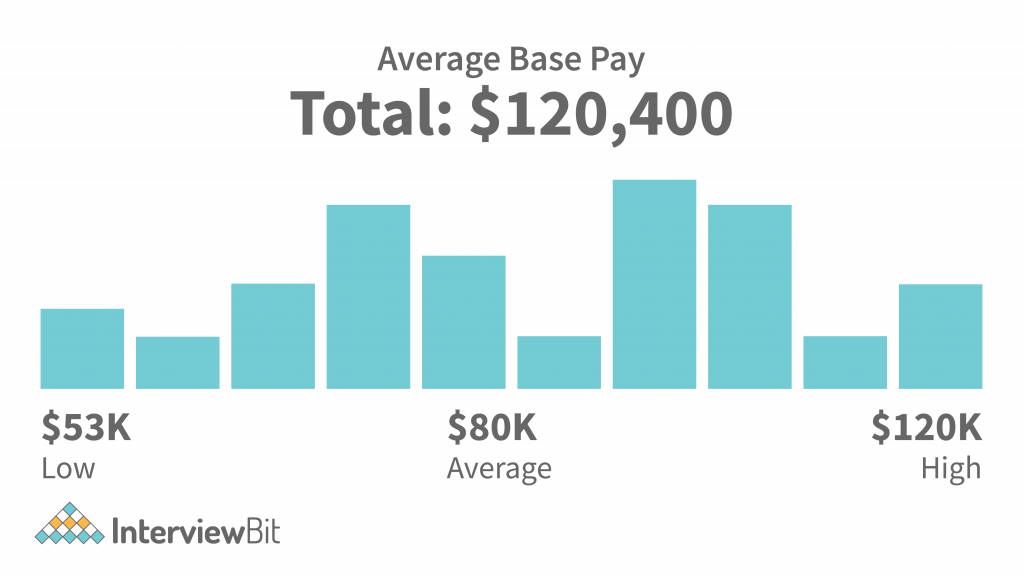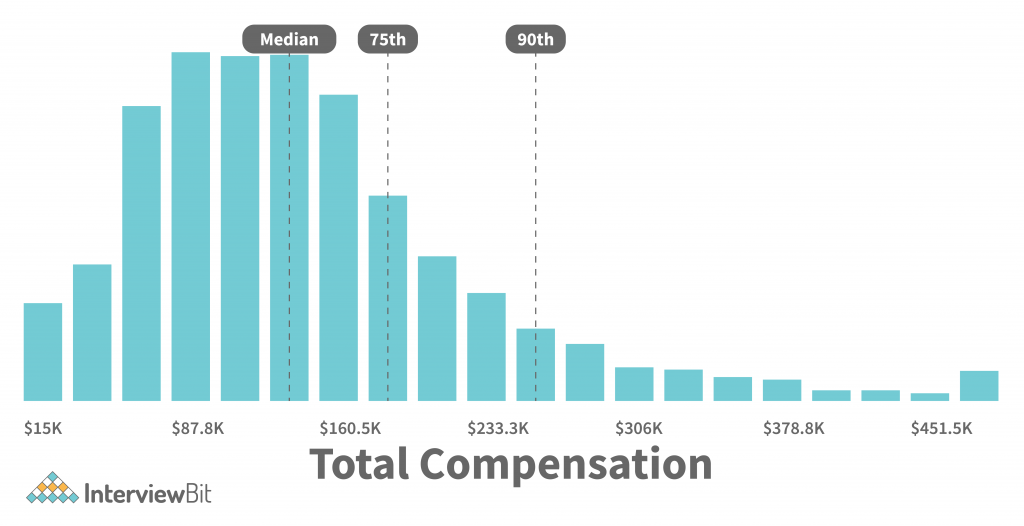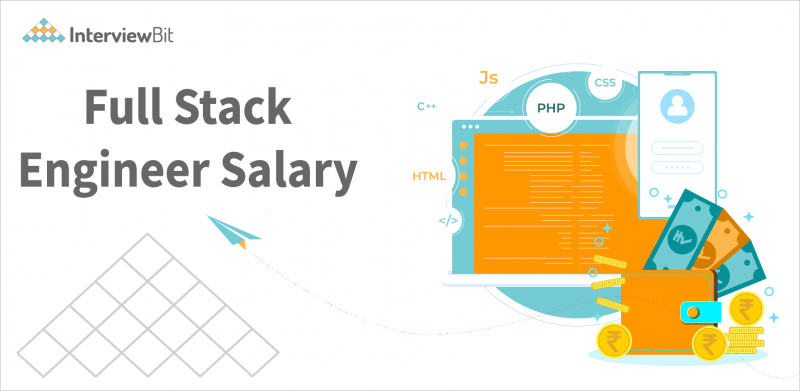- What is a Full Stack Engineer?
- Job Roles and Responsibilities of a Full Stack Engineer
- Full Stack Engineer Salary
- Full Stack Engineer Salary by Experience:
- Full Stack Engineer Salary by Location:
- Full Stack Engineer Salary by Skill Set:
- Full Stack Engineer Salary by Employer:
- How to Become a Full-Stack Engineer?
- Conclusion
- FAQs
- Q.1: Are full-stack engineers paid more?
- Q.2: Is a full-stack developer a good career?
- Q.3: What kind of duties should a full-stack engineer do?
- Additional Resources
If you’ve ever wondered how much money you could make as a full-stack engineer, you’re not alone. That’s because there’s no standard salary for this role, which means it can be difficult to know how much you can make when you first start exploring your options. However, as with most things in life, the answer is not as complicated as you might think. With the right amount of experience, education, and specialization, you can earn a respectable salary as a full-stack engineer. To help give you an idea of what to expect, and how much you could realistically earn as a full-stack engineer, we’ve put together a list of data on salaries for full-stack engineers.
What is a Full Stack Engineer?
As the world of tech changes and is ever-evolving, you might find yourself in a reactive position with regard to your skillset. With that said, a full-stack engineer can be anyone who has excellent programming skills backed by experience building out bug-free software that is predominately web-based. A full-stack engineer is a person who’s responsible for designing and building everything related to the function of a digital product. This can include everything from web application code to database systems to how the product’s shipping process works. Full-stack engineers are often responsible for multiple products at once, which means they need to know how to solve problems across multiple fields of expertise. They typically work in teams and assume the roles of product manager, architect, engineer, and so on.
Job Roles and Responsibilities of a Full Stack Engineer
The full-stack engineer is an all-around master-of-many role. Using the entire engineering senior professional skills makes the end product impressive. Basic characteristics of a full-stack engineer include:
Confused about your next job?
There are several ways for full-stack engineers to be successful, which include experience development and language mastery. With training and experience, full-stack engineers can build new features within different arduous environments. Languages such as NodeJS tend to have good API capabilities and many of them are easy to learn while others have ill-constructed APIs due to modern design concepts like modularity, asynchronous chained structures, etc. To become a successful full-stack engineer, developers must first determine their technical expertise and pick out abilities that they enjoy doing.
Full Stack Engineer Salary
For the current and past 4 years, the average salary of the revenue software developer has expanded to $120,400 USD, while test automation or security analysis software developer gets into the top 20. The median base yearly salary for full-time is 53K USD. Let’s see the salary in detail:

Source: Glassdoor
Full Stack Engineer Salary by Experience:
The number of years, you work in that position depends on how much trust and respect you can gain from your clients and how much knowledge you spread to your team members, which helps with scaling up the growth rate and salary. You can get a working salary of $200K with just 1-2 years’ experience for someone who steers towards Full-stack development and about 5-6 years of overall experience can earn up to $620K. Here is a list of salaries for different experienced people:
| Years of Experience | Average Salary |
| 1-3 Year | $200K |
| 3-10 Year | $248K |
| 8-10 Year | $380K |
| 10-15 Year | $620K |
Full Stack Engineer Salary by Location:
The full-time experienced Full Stack developer or engineer in California or New Jersey is approaching a base salary of 100K USD while that in Iowa stands only beyond $60K-$120K USD but these states have shown a strong performance than others as even Illinois ranks near Iowa at $120K! as per a report by Glassdoor in 2021. (we have seen the record since 2015) The other states following above may not vary by much but still, they do not feel budgeted to hire a Full Stack Developer who will make them comparable to those living and working in Silicon Valley or Seattle, Washington state because of their prolonged tax rates and worker socio-economic disadvantages on both cost side for labor and investment incentives on spend side; especially with peer and partner organizations moving away from software development. On the Higher Cost side with Oregon as No.1 and New Jersey at 3rd rank, North Carolina is paying a higher base salary at 125K USD, followed very close by Texas which boasts almost 115K down to Oklahoma. And finally, those states could be clubbed companies – Michigan State around 60-100K range, Florida significantly cheaper option. Here is the list of salaries by different cities in the USA:
| Location | Average Salary |
| Palo Alto | $150K |
| Menlo Park | $125K |
| San Jose | $122K |
| New York | $112K |
| Seattle | $115K |
| Austin | $120K |
| Redmond | $130K |
| Chicago | $143K |
Full Stack Engineer Salary by Skill Set:
When we accept a few common skills for a technology stack, our resume may attract hiring managers. You don’t need to be an expert in each and every field of action, because there is much to learn from those skilled individuals who are already doing this badly. Things like insurance payouts are different from medical insurance which saves lives and make people happy so you can monetize your skills in ways that will benefit future users with potential clients. You need to be good with javascript, nodejs, reactjs, python, etc. Here is the list of salaries of full-stack engineers by different skills:
| Skills | Salary |
| Full Stack Engineer | $180,4553/yr |
| Web Developer | $165,753/yr |
| Front-end Developer | $150,866/yr |
| Backend Developer | $155,764/yr |
| JavaScript Developer | $160,745/yr |
| Reactjs Developer | $170,863/yr |
| Nodejs Developer | $164,834/yr |
| Angular Developer | $140,474/yr |
| Java Developer | $168,843/yr |
Full Stack Engineer Salary by Employer:
Developers can expect to earn on average $100,992 per year in the U.S. and receive a bonus of approximately 10% of their salary – or up to 7500 US dollars – each year as well. Here is the list of company that pays a lot to full-stack developers:
| Company | Average Salary |
| Amazon | $170K |
| $150K | |
| $175K | |
| $161K | |
| Apple | $172K |
| eBay | $165K |
| Cisco | $155K |
| Walmart | $168K |

How to Become a Full-Stack Engineer?
Now that you know what a full-stack engineer does and what their salary might be, it’s time to get started on the path to becoming one. To do that, here are a few tips to keep in mind when exploring engineering as a career path:
- Learn programming languages – Like all things, being a full-stack engineer is only as good as the programmer behind it. Engineers who can program with ease can easily maintain the parts of their company’s app, build more complex products for more users, write new and improved code, secure the infrastructure behind their applications and help optimize costs. To become a good programmer and developer in any particular language you will have to learn and practice it often. Because there are so many languages, each one backed with tons of best practices all over the internet, there is no way that you will come by them as a beginner going through school…
- Consider education path – The good news is that learning any programming language doesn’t have to end when you set foot in college; nearly every major programming elective meets basic skills that most of your future colleagues are likely to need.
- You have a choice – You can get the degree and focus entirely on identified in Academia, while still satisfying your programming skills Online and there are enough options to choose from – this article will try and guide you towards the least time to be spent in getting formally and fully prepared as a software engineer.
- Network and Make Connections – Networking is important in any industry, and it’s essential when pursuing a career in engineering. You can meet and make connections with people in your industry, and you can also network with people in other fields that you’d like to work in.
- Invest in Your Education – While you may be interested in engineering as a career path, there’s no shame in starting out in another field. Engineering is a challenging field, and you may find that a degree in business, computer science, or another field provides you with a more flexible education that’s applicable to engineering.
- Take the First Step – Much like architecture in architecture or cinematography in cinema, it’s hard to know exactly what (and how) you want to do first as a professional, so take the first step. If a specific discipline appeals to you, start researching that way of working and learn more while you build your resume.
- Be Prepared to Learn Things You Don’t Know – No one is perfect at everything. In fact, many of those in the engineering field have multiple interests and lots of things going on outside their work environment. While the study is critical to all careers; working engineers need skills they can use while they’re actively building upon new technologies and fields. Pursuing advanced skills without also narrowing your range of expertise could result in losing your job if worst comes to worst (if technology reduces your job function).
- Build a Solid Resume – Engineering is a highly competitive field with a lot of people who have backgrounds in science, mathematics, and other technical fields. Because of this, it can be difficult to find work. Your resume needs to highlight your experience and explain how it relates to the job you’re applying for.
- Follow Up – Remember that it can take months to find a new engineering job, and during that time you don’t want to lose your current employer. Make sure to keep in touch with your manager or engineer lead and follow up when you don’t hear back from them.
Conclusion
Engineering is an exciting field that allows you to apply your technical skills to solve real-world problems. If you want to make an impact on the world and work with people, this is the job for you. In order to be successful as an engineer, you’ll need more than just a passion for technology; you’ll need to be passionate about solving problems and being open to learning new things. In order to do this, you’ll want to network with engineers from other companies, invest in your education, build a solid resume, and follow up with your manager once you land a job. With these tips, you’ll be well on your way to becoming a full-stack engineer.
FAQs
Q.1: Are full-stack engineers paid more?
Answer: As of 2017 according to the Bureau of Labor Statistics full-stack engineers tend to make more than software engineers. As of the most recent report (May 2016), The median annual salary for a full-stack software developer was $105,950 while Software Developers were making $106,050. Full-stack engineers not only had higher compensation than their programming counterparts but also fared a bit better overall – they had an annual average well above the average college-educated worker’s income as well.
Q.2: Is a full-stack developer a good career?
Answer: Full-stack engineering is a good career if you have a passion for technology. Being a full-stack engineer might be exciting, but it also requires excellent communication skills, and you need to contend with algorithm complexity. It is a good career if you want to learn new technologies since you will be exposed to many different areas of software and hardware.
Q.3: What kind of duties should a full-stack engineer do?
Answer: Full-stack engineers have three core functions: building the end-user experience, ensuring that their application suits a particular need or flawlessly serves several; taking care of low-level development by writing efficient code logic; and bringing in some work that engineers that specialize in business know-how.







 Join WhatsApp Group
Join WhatsApp Group


